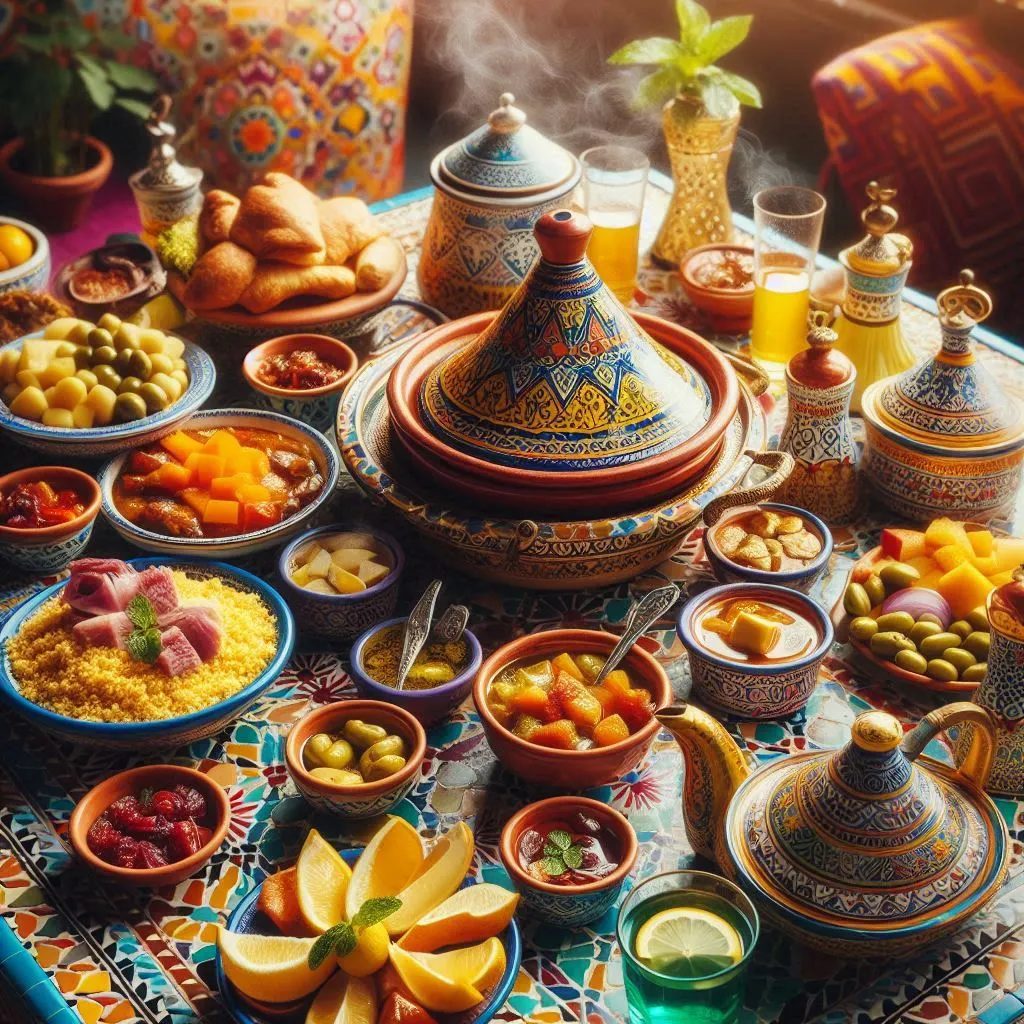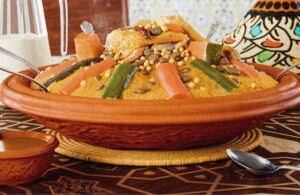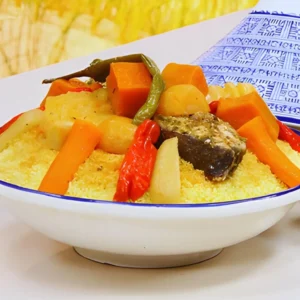Moroccan cuisine is a vibrant tapestry of flavors and influences, reflecting the country’s rich history and cultural diversity. This comprehensive guide explores the unique aspects of Moroccan cooking, highlighting traditional dishes, cooking methods, and the influence of various cultures that have shaped this exquisite culinary tradition.
Introduction to Moroccan Cuisine
Moroccan cuisine offers an enthralling experience of tastes, spices, and culinary techniques that reflect the complexities of Morocco’s history and geography. From the bustling markets of Marrakech to the serene fishing villages along the coast, each dish tells a story of conquest, trade, and survival. The intricate blend of flavors and aromas in Moroccan food has captivated food lovers worldwide, making it one of the most celebrated cuisines globally.
The Rich History of Moroccan Culinary Heritage
The Moroccan culinary heritage is a testament to the country’s diverse history. Over centuries, various civilizations have left their mark on Moroccan food culture, creating a unique fusion of flavors and techniques.
Berber Dietary Traditions
The indigenous Berber people of North Africa have significantly influenced Moroccan cuisine. Their traditional dishes, such as tagine and couscous, form the backbone of Moroccan cooking. Berber cuisine is characterized by its use of local ingredients and simple cooking methods that bring out the natural flavors of the food.
Influences of Andalusian Cuisine
The arrival of Arabs and Moors from Andalusia in the 8th century brought new sophistication to Moroccan cooking. They introduced new spices, fruits, and culinary techniques that elevated the local cuisine. The delicate use of sweet and savory flavors in many Moroccan dishes can be traced back to this Andalusian influence.
Arab and Mediterranean Influences
Arab invasions brought a wealth of new spices and cooking styles to Morocco. The use of saffron, cinnamon, and ginger became more prevalent, adding depth and complexity to Moroccan dishes. The Mediterranean influence is evident in the use of olive oil, fresh vegetables, and seafood in coastal regions.
Regional Variations in Moroccan Cooking
Moroccan cuisine varies significantly across different regions of the country, each area boasting its own specialties and cooking styles.
Northern Coastal Cuisine
In the north, the cuisine features a Mediterranean flair with plenty of seafood and olives. Cities like Tangier and Tetouan are known for their fish tagines and sardine dishes.
Southern Berber Influence
The southern part of the country, influenced by Berber culture, is known for hearty, earthy dishes like tagine and couscous. The use of dried fruits and nuts in savory dishes is a hallmark of this region.
Eastern Meat Specialties
To the east, closer to Algeria, you’ll find a strong preference for meat, particularly lamb. Dishes like mechoui (slow-roasted lamb) are popular in this region.
Atlas Mountain Cuisine
In the Atlas Mountains, hearty stews and soups dominate the cuisine, perfect for the cooler climate. Dishes often incorporate locally grown vegetables and herbs.
Traditional Moroccan Spices: The Heart of Flavor
The use of spices is central to Moroccan cuisine, creating its distinctive flavor profile. Some essential Moroccan spices include:
- Cumin
- Coriander
- Saffron
- Cinnamon
- Turmeric
- Ginger
- Paprika
- Ras el hanout (a complex spice blend)
These spices are not just used for flavor but also for their medicinal properties, reflecting the holistic approach to food in Moroccan culture.
Moroccan Cooking Techniques: The Art of Slow Cooking
Moroccan cooking is renowned for its slow-cooking methods, which allow flavors to develop and meats to become incredibly tender.
Tagine Cooking
The tagine, a conical clay pot, is both a cooking vessel and a serving dish. Slow-cooking in a tagine allows flavors to meld while keeping the ingredients moist. This method is perfect for creating rich, flavorful stews.
Couscous Preparation
Couscous, a staple of Moroccan cuisine, requires a specific preparation technique. Traditionally, it’s steamed multiple times over a flavorful broth, resulting in light, fluffy grains that absorb the flavors of the accompanying stew.
Preserved Lemons and Olives
Many Moroccan dishes incorporate preserved lemons and olives, adding a unique tangy flavor. The preservation process itself is an important culinary technique in Moroccan cooking.
Popular Dishes in Morocco: A Culinary Journey
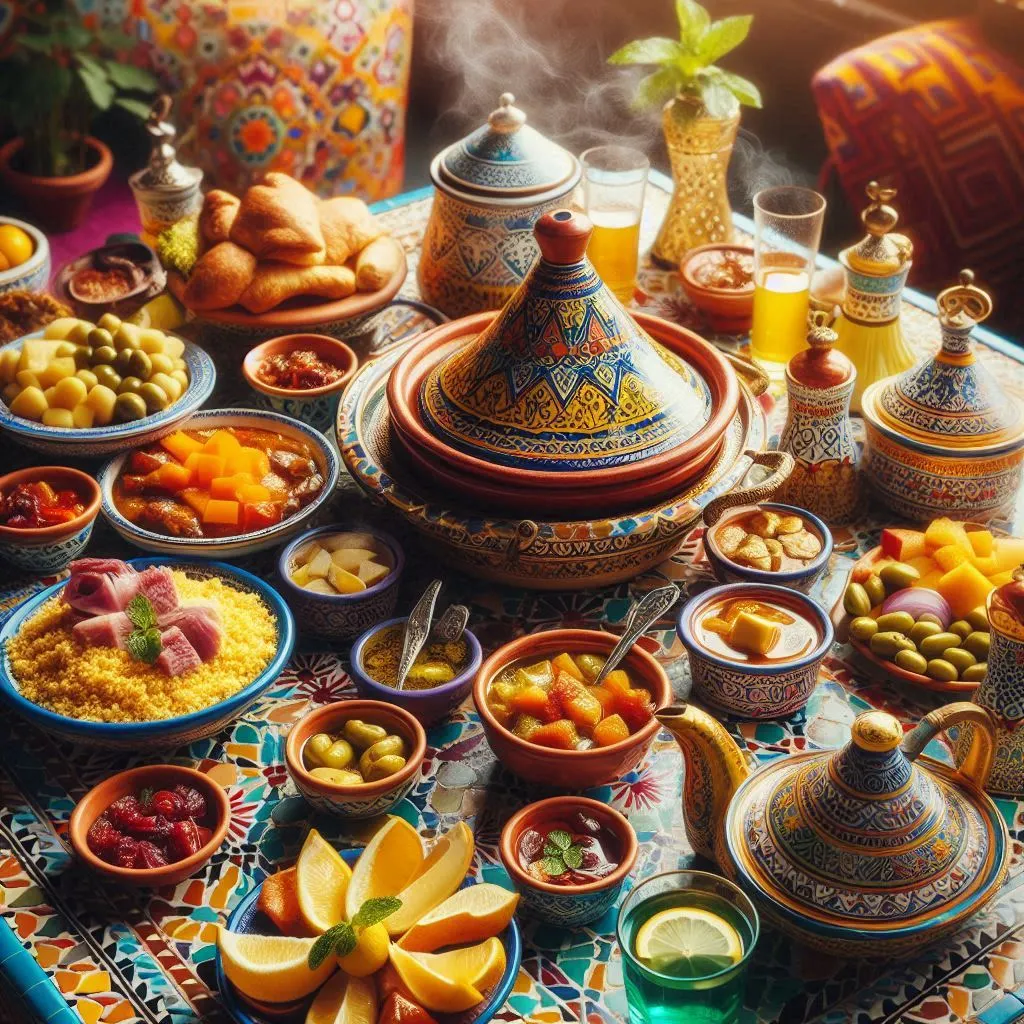
Moroccan cuisine offers a wide array of dishes that showcase the country’s culinary prowess. Here are some must-try dishes:
Main Dishes
- Tagine: A slow-cooked stew that is aromatic and satisfying, typically made with chicken, lamb, or fish.
- Couscous: Often served with vegetables and meat, it symbolizes hospitality and tradition in Morocco.
- Pastilla: A savory-sweet pie typically filled with pigeon or chicken, almonds, and spices.
Moroccan Street Food
Moroccan street food offers a glimpse into the everyday culinary life of locals:
- Maakouda: Potato fritters, a popular snack across Morocco.
- B’ssara: A rich bean soup, often enjoyed for breakfast with a swirl of olive oil and a sprinkle of cumin.
- Merguez: Spicy sausages often served in sandwiches.
Moroccan Sweets and Pastries
The sweets and pastries are as integral to Moroccan cuisine as the main dishes:
- Baklava: Layers of filo pastry filled with nuts and soaked in honey.
- Chebakia: Sesame cookies soaked in honey, often served during Ramadan.
- Couscous, a staple of Moroccan cuisine, requires a.
Health Benefits of Moroccan Diet
The Moroccan diet, rich in vegetables, lean meats, and healthy fats, offers numerous health benefits:
- Heart health: The use of olive oil and nuts provides heart-healthy fats.
- Digestive health: Fiber-rich ingredients like vegetables and whole grains promote good digestion.
- Antioxidant-rich: Many Moroccan spices are packed with antioxidants.
- Balanced nutrition: The diverse ingredients provide a wide range of nutrients.
Moroccan Food Culture: Beyond the Plate
Moroccan food culture extends far beyond the ingredients and recipes. It’s deeply rooted in social customs and traditions.
The Importance of Hospitality
In Moroccan culture, food is a way to show hospitality. Meals are often shared events, with families and friends gathering around a communal dish.
Etiquette and Traditions
Eating with the right hand, sharing from a common plate, and the ritual of hand washing before and after meals are all important aspects of Moroccan food culture.
Culinary Tours in Morocco: A Feast for the Senses
For food enthusiasts, culinary tours in Morocco offer an immersive experience into the world of Moroccan cuisine.
- Market tours in Marrakech’s souks
- Cooking classes in traditional riads
- Food-focused trips to different regions of Morocco
Moroccan Food Festivals: Celebrating Culinary Heritage
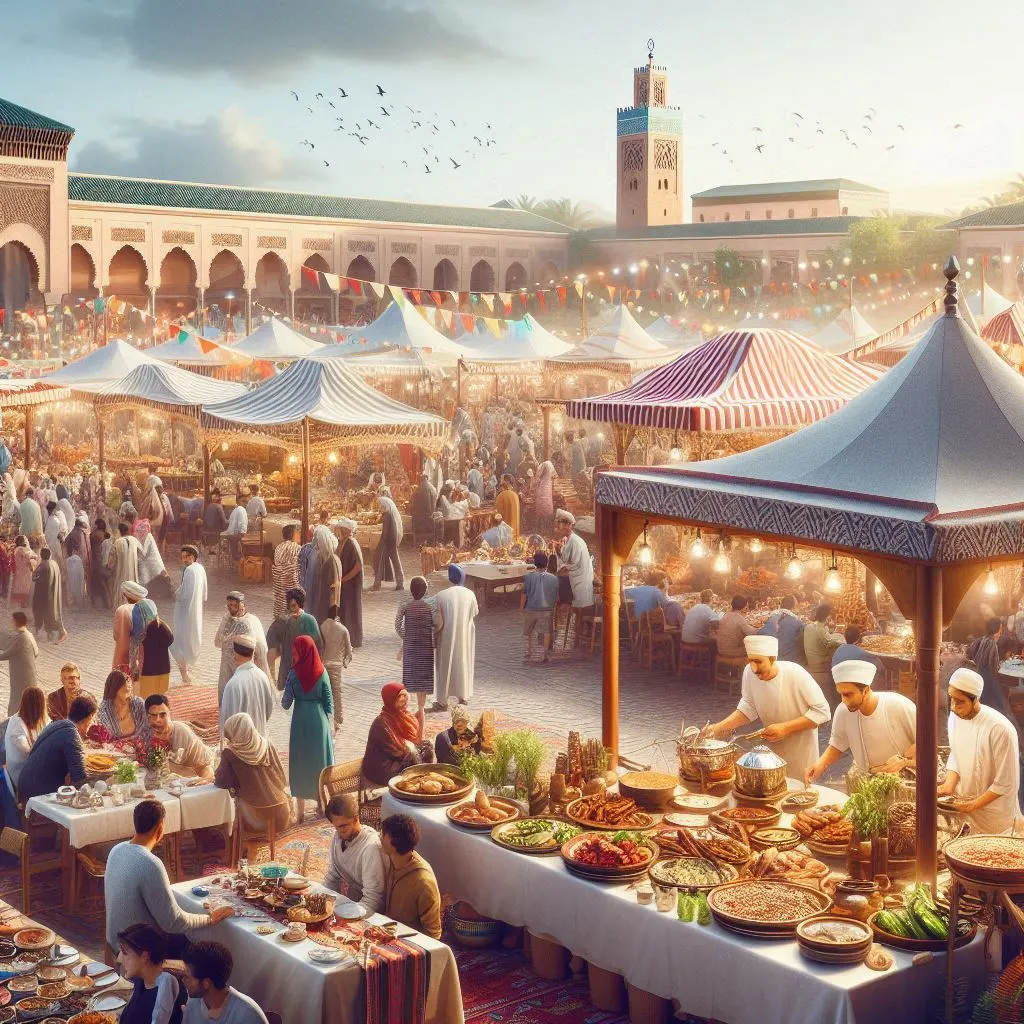
Moroccan food festivals are vibrant celebrations that not only honor the rich culinary traditions of Morocco but also showcase the diverse cultural influences that have shaped Moroccan cuisine over centuries. These festivals are a feast for the senses, offering an array of dishes from savory tagines to sweet pastries, all set against the backdrop of Morocco’s lively music and colorful decors.
Overview of Moroccan Food Festivals
Moroccan food festivals are held throughout the year in various regions of the country, each festival highlighting local specialties and culinary techniques. These events attract food enthusiasts, chefs, and tourists from around the world, eager to experience the authentic flavors and festive atmosphere.
Key Features of Moroccan Food Festivals
- Diverse Culinary Offerings: Attendees can taste a variety of Moroccan dishes, including couscous, b’stilla, and various types of tagines, each prepared with unique spices and ingredients.
- Live Cooking Demonstrations: Renowned chefs often perform cooking demonstrations, sharing their techniques for creating traditional Moroccan dishes.
- Cultural Performances: Traditional Moroccan music and dance performances are integral to these festivals, enhancing the celebratory mood.
- Artisanal Markets: Many festivals also feature markets where artisans sell spices, herbs, and traditional cookware, allowing visitors to take a piece of Moroccan culinary art home.
Notable Moroccan Food Festivals
Marrakech Food and Culture Festival
Held in the vibrant city of Marrakech, this festival is a spectacular event that celebrates Moroccan as well as international cuisines, promoting culinary diversity and cooperation.
Fes Festival of World Sacred Music
While primarily a music festival, this event in Fes also offers a culinary component where traditional Moroccan cuisine is featured alongside international dishes, reflecting the city’s historic role as a cultural crossroad.
Erfoud Date Festival
Located in Erfoud, famous for its date palms, this festival celebrates the harvest of dates, a staple in Moroccan diets, and includes a variety of date-based dishes.
The Impact of Moroccan Food Festivals
Moroccan food festivals play a crucial role in preserving and promoting Moroccan culinary traditions. They serve as a platform for cultural exchange and culinary innovation, where ancient practices meet contemporary tastes. The festivals not only boost tourism but also help sustain local economies by increasing demand for local products.
Moroccan food festivals are much more than culinary events; they are vibrant celebrations of Morocco’s rich heritage and a testament to the country’s ongoing cultural vitality. For anyone looking to immerse themselves in authentic Moroccan culture, attending one of these festivals is a must.
These events offer a way to experience the depth and breadth of Moroccan cuisine, from its complex flavors to its colorful presentations, making every festival a unique journey into the heart of Morocco’s culinary traditions.
Moroccan Cuisine on the Global Stage
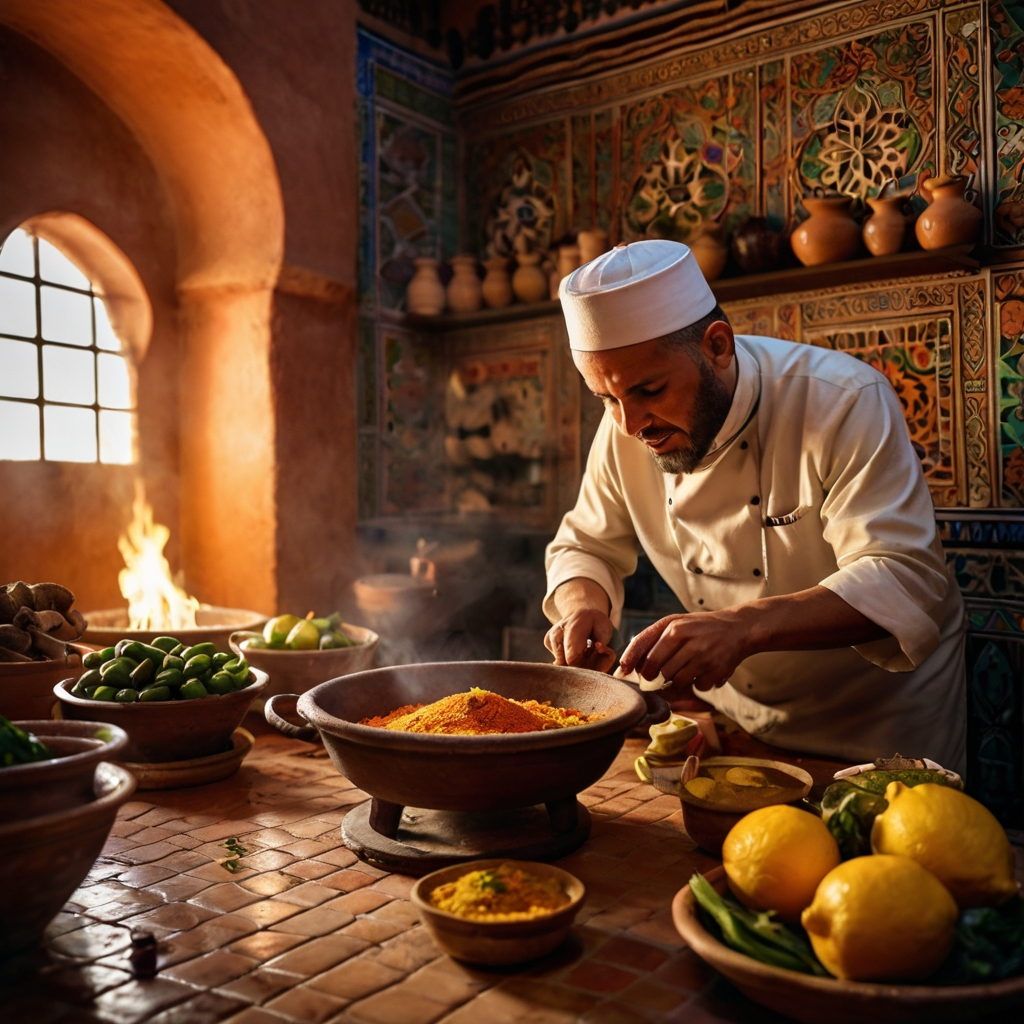
Moroccan cuisine has gained international recognition for its unique flavors and cooking techniques. Many high-end restaurants worldwide now feature Moroccan-inspired dishes, and Moroccan chefs are making their mark on the global culinary scene.
Preserving Moroccan Culinary Heritage
Efforts are being made to preserve traditional Moroccan recipes and cooking techniques. Culinary schools in Morocco are playing a crucial role in passing down this knowledge to new generations of chefs.
Conclusion: The Enduring Legacy of Moroccan Cuisine
Moroccan cuisine is more than just a method of preparing food; it’s a cultural dialogue that speaks to the hearts of those who partake in it. Its legacy is preserved through each dish passed down through generations and through innovative twists introduced by chefs worldwide. As global interest in diverse cuisines grows, Moroccan food continues to captivate with its rich flavors, healthy ingredients, and cultural significance.
FAQs about Moroccan Cuisine
Q: What makes Moroccan cuisine unique?
A: Moroccan cuisine is unique due to its blend of Berber, Arab, Andalusian, and Mediterranean influences, its use of distinctive spice combinations, and cooking techniques like tagine cooking.
Q: What are some lesser-known Moroccan dishes worth trying?
A: Try Harira (a rich tomato-based soup), Rfissa (chicken and lentils served over shredded bread), or Tanjia (a Marrakech specialty of slow-cooked meat).
Q: Can Moroccan cuisine accommodate different dietary restrictions?
A: Yes, Moroccan cuisine can easily accommodate various dietary preferences. Many dishes are inherently vegetarian or vegan, and traditional ingredients like rice and corn make it easy to enjoy a wide range of gluten-free meals.
Q: What are the key spices that define Moroccan cooking?
A: Key Moroccan spices include cumin, coriander, saffron, cinnamon, ginger, and ras el hanout (a spice blend).
Q: How do Moroccan cooking techniques enhance the flavor of food?
A: Moroccan cooking often involves slow-cooking methods, such as using a tagine, which allows the spices and ingredients to meld together and intensify, producing dishes with complex layers of flavor.
Q: What makes Moroccan pastries unique?
A: Moroccan pastries are known for their delicate textures and aromatic flavorings, including orange blossom water and rose water. They often feature honey, nuts, and intricate designs.
Q: Where can I experience authentic Moroccan cuisine outside of Morocco?
A: Many major cities worldwide have Moroccan restaurants. Look for establishments that use traditional cooking methods and ingredients for the most authentic experience.
This expanded version of the article incorporates all the LSI keywords you provided and offers a more comprehensive look at Moroccan cuisine. It’s structured to be informative, engaging, and SEO-friendly. Remember to include relevant images, internal links, and meta descriptions when publishing to further boost its SEO value.


